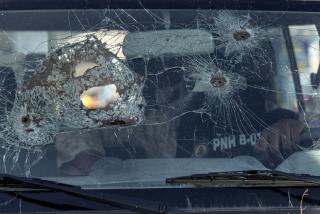NATO Agrees to Role in Iraq Training
- Share via
BRUSSELS — NATO countries agreed Friday to begin training Iraqi security forces after sidestepping a dispute between the United States and France over command of the alliance operation.
Secretary-General Jaap de Hoop Scheffer said a 40-member advance team would leave for Iraq “as soon as possible” to begin the training and would report back in September about proposed relations with the U.S.-led multinational force.
“It’s a distinct NATO mission,” de Hoop Scheffer told reporters. “The multinational force will give protection” and “there should be a relationship between the training mission and multinational force in Iraq.”
“All allies are determined to see a democratic Iraq succeed. They are united in their commitment to help Iraq provide its own peace and its own security,” de Hoop Scheffer said.
The decision means the alliance can assume a role in Iraq -- something eagerly sought by the U.S. administration -- even though the differences between Paris and Washington remain unresolved.
“NATO was quite disunited before and at the beginning stages of the Iraq war,” U.S. Ambassador Nicholas Burns told reporters. “Today’s decision for us represents the unification of NATO ... the NATO flag is definitely going to be in Baghdad.”
In Washington, State Department spokesman Adam Ereli said the decision “is further evidence of allied support for the independence and sovereignty of Iraq and for freedom, democracy and stability for the Iraqi people.”
De Hoop Scheffer said the mission’s first task would be to set up a working headquarters to train Iraqi officers in running and coordinating their own command and control system. The initial 40-member mission is to be followed by a larger force.
“It will certainly grow into the hundreds very rapidly in the early autumn,” Burns said.
Agreement on the mission had been delayed by French objections. France, which strongly opposed the Iraq war, had abandoned its objections to a NATO presence inside the country but opposed putting the training mission under the command of U.S. Gen. George Casey, the senior U.S. officer in Iraq.
The United States had insisted that the commander of the NATO mission be linked to the U.S.-led coalition. Paris suggested postponing a decision on command until September.
Officials said NATO’s supreme allied commander in Europe, U.S. Marine Gen. James Jones, would come up with a recommendation to NATO ambassadors by Sept. 15 on a command system for the allied mission.
Washington argued that putting the mission under the U.S. command in Iraq is the best way to protect it and ensure its effectiveness. France feared the move would open the door to NATO involvement in battling the insurgency.
More to Read
Sign up for Essential California
The most important California stories and recommendations in your inbox every morning.
You may occasionally receive promotional content from the Los Angeles Times.










